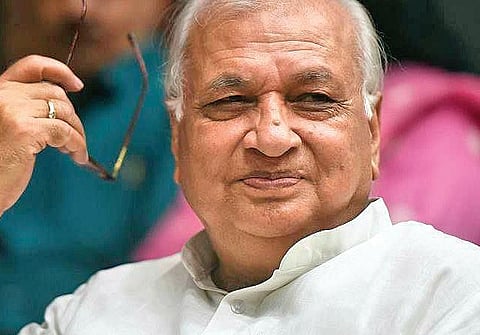

KOCHI: If Governor Arif Mohammed Khan sits deliberately on bills passed by the Kerala assembly without giving consent, the government has the option to approach the court, say constitutional experts. On the ongoing spat between Khan and the government, they said the governor will be doing an “unconstitutional act” if he withholds or denies nod to the bills. He may be committing sheer abuse of the gubernatorial office, they said.
Kaleeswaram Raj, a senior lawyer with the Supreme Court, told TNIE that the present Raj Bhavan- government impasse in Kerala, if not resolved otherwise, might require a judicial solution. Echoing his remarks, former Lok Sabha secretary-general and constitutional expert P D T Achari said the governor is constitutionally bound to give assent to the bills.
“If the governor refuses, actually the Constitution does not say anything about it. However, if the government wants to pursue the matter, it can approach the Supreme Court contending that the governor has performed his option without applying his mind. Then the Supreme Court may either ask the governor to give assent or agree with the decision of the governor,” Achari said. If the governor sits on the bills, he will be acting against the Constitution, he added.
Raj pointed out that the governor has openly declared he won’t give assent to the bills amending the Lok Ayukta Act and the University Law. Under Article 200 of the Constitution, he can either give assent or temporarily withhold a bill, or reserve it for the consideration of the President. He can also ask the House to reconsider the bill on certain specified areas. If the assembly does not agree, he has to give assent.
“Going by the scheme of the Constitution, the governor cannot make an outright declaration that he won’t give assent. He has stated so, even before seeing the text of the bills and before applying his mind. That is an insult to the cabinet, the assembly and the people of the state. If one finds fault with the content of the law, it is for the constitutional court to review it and strike it down,” Raj said.
‘Guv’s gesture unconstitutional’
Kaleeswaram Raj said an assembly is entitled to make even bad laws. The governor is not expected to impose his opinion on the laws intended to be made by the assembly through democratic process. “The governor’s gesture is per se unconstitutional. It is impermissible. This is sheer abuse of the gubernatorial office. This situation would warrant the court’s interference. The government can move the judiciary in this regard,” Raj added. Achari said the governor has to exercise his power carefully. “The assembly is the law-making body of the state and the law is made for the benefit of society.
Hence, the governor has to exercise his options very carefully. There are no cases before us in which the governor rejected a bill passed by the assembly. In 1958, Kerala’s Education Bill was sent to the President to take a final decision. And the President sent it to the Supreme Court for further opinion,” he added. If the bills are not assented to by the governor for one reason or the other, he will create a constitutional crisis. It means the governor does not exercise his option as per the Constitution, which is an unconstitutional Act, said Achari.
Left approaches Prez
A day after the governor lashed out at the Kerala government, CPI leader Binoy Viswam wrote to
President Droupadi Murmu seeking her intervention. He said the governor has been adopting a confrontational approach towards the state government
Guv goes ahead with Kerala Univ VC selection
T’Puram: Governor Arif Mohammed Khan went ahead with the process to select a new VC for Kerala
University on Tuesday, a day after his assertion that he will not sign the recentlypassed university
amendment bill that aims to limit his powers in the selection of VCs